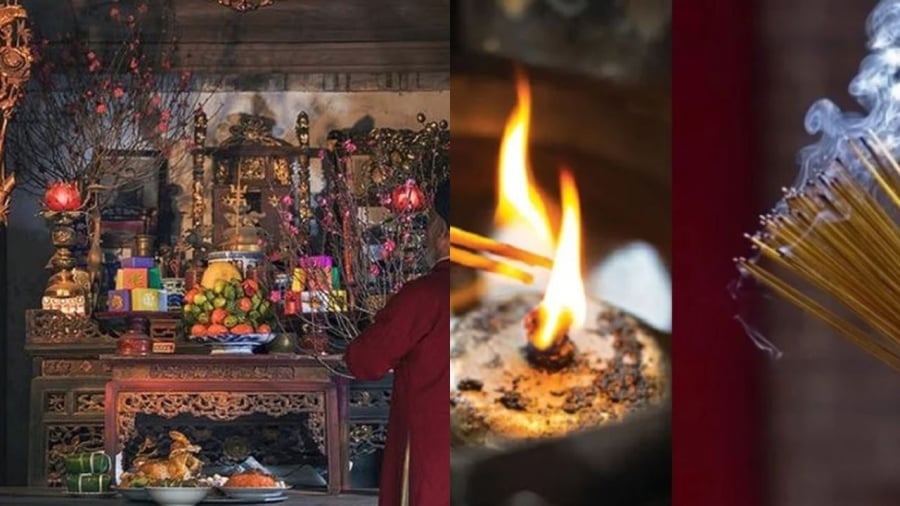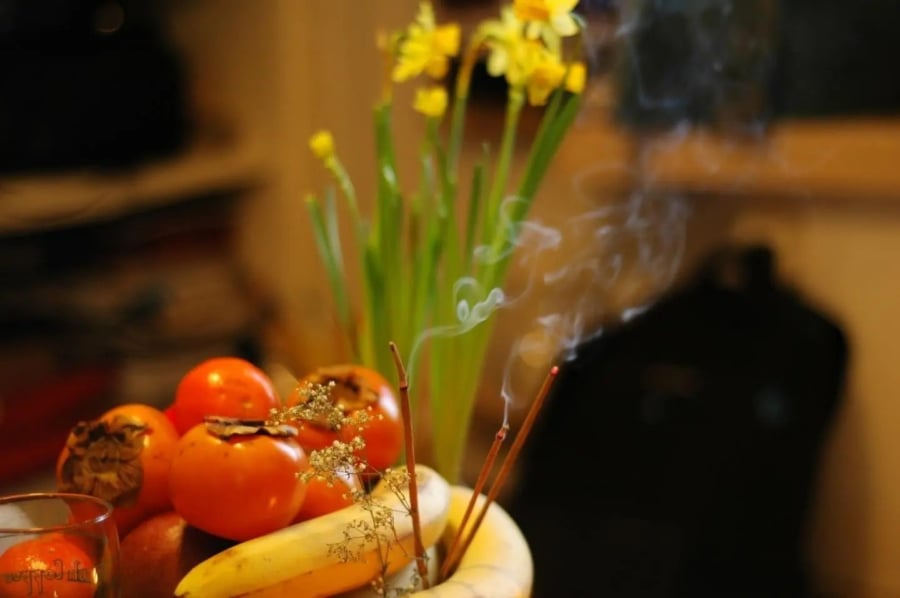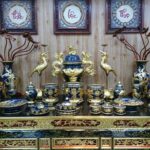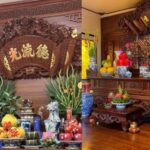The Significance of Incense Offering
Incense offering is an integral part of Vietnamese spiritual culture, and it holds a deep significance. During a ceremony, the act of lighting incense marks the beginning of the ritual. Incense is seen as a sacred object, symbolizing piety, purity, and good intentions.
Lighting incense is more than just a ritual; it serves as a connection between the living, their ancestors, and the divine. It is a means for individuals to convey their sincerity and wishes to the spiritual realm. A ceremony is not considered officially started until the incense is lit.

Incense offering is an essential ritual during ceremonies.
In a worship space, the aroma of incense creates a serene atmosphere and serves as a bridge between the physical and spiritual realms. Lighting incense is an act of reverence, remembrance, and honor towards one’s ancestors and deities. As the incense burns, the ceremony commences, providing a space for the host to express their prayers and wishes.
In spiritual practices, incense is typically offered on significant days such as the first and full moon days of the lunar calendar, ancestral worship days, festive holidays, and occasions dedicated to deities and ancestors.
Traditionally, the first and full moon days of each month are considered auspicious for incense offerings. These days coincide with the changing phases of the moon, which are believed to influence natural elements and the earth’s gravitational forces. Offering incense during these times is a long-standing custom, seeking blessings, and fortune from the divine and ancestral spirits.
Why Ancestors Advised Against Lighting Incense at Night
In spiritual culture, the night is associated with strong yin energy and weakened yang energy after sunset. According to the yin-yang concept, the daytime belongs to the yang, while the night is dominated by yin energy, a time when ghosts, and spirits are believed to be most active.
Lighting incense is believed to create a connection between the living and the afterlife, inviting the presence of the divine and the ancestors. However, doing so at night may also inadvertently invite wandering spirits and hungry ghosts, which is considered unfavorable for the host family. Moreover, the smoke and scent of incense at night can create an eerie ambiance, causing unease and fear among family members.
Evenings are meant for family gatherings and preparation for rest. The smoke from incense can disrupt the peace and affect the sleep of those in the household. Performing spiritual rituals at night also increases the risk of negative spiritual influences entering the home, impacting the family’s health and fortune. Lighting incense at this time further strengthens the yin energy, potentially leading to spiritual and physical deterioration for family members.

Lighting incense connects the living and the afterlife.
Notes on Lighting Incense
On the first and full moon days, it is advisable to prepare offerings and light incense in the morning, preferably before noon, as the yang energy is stronger and more conducive for worship.
While incense is a necessary spiritual item, ensure that the incense is of good quality and free from harmful chemicals. When lighting incense, keep the room well-ventilated to prevent smoke accumulation, and avoid lighting too many sticks at once to reduce the risk of fire. Odd numbers of incense sticks are preferred, with one or three being the most auspicious. Refrain from using excessive amounts.
When lighting the incense, use your hand to gently wave and extinguish the flame, avoiding the use of your mouth, as it may be considered disrespectful and unhygienic.
Ensure that the incense sticks placed on the altar are dry and unbroken. Damp or broken incense may fail to burn properly, bringing bad luck. Broken incense also signifies misfortune and should be avoided.
For home altars, it is recommended to use only stick or cone incense. Avoid using spiral incense coils in the ancestral altar, as it is considered taboo. Spiral incense coils are reserved for temples and shrines dedicated to deities. Placing a spiral coil in the ancestral altar is akin to piercing it with a sharp object, creating negative energy and disturbing the peace of the ancestors, which can bring ill fortune to the family.
The Hive’s Warning: Never Lend or Borrow a Comb
Introducing the humble hairbrush – a familiar daily essential, but did you know there’s a long-held superstition around lending it to others? It’s time to unravel the mystery behind this curious taboo.
The belief stems from an old wives’ tale that lending your hairbrush could lead to a transfer of energy and, with it, a host of potential problems. From bad luck and tangled relationships to, quite literally, tangled hair, the consequences were thought to be far-reaching.
So, next time you’re tempted to lend a friend your hairbrush, remember the age-old superstition and perhaps offer a hair tie instead! It’s always better to be safe than sorry, especially when it comes to maintaining smooth locks and a smooth life.



































